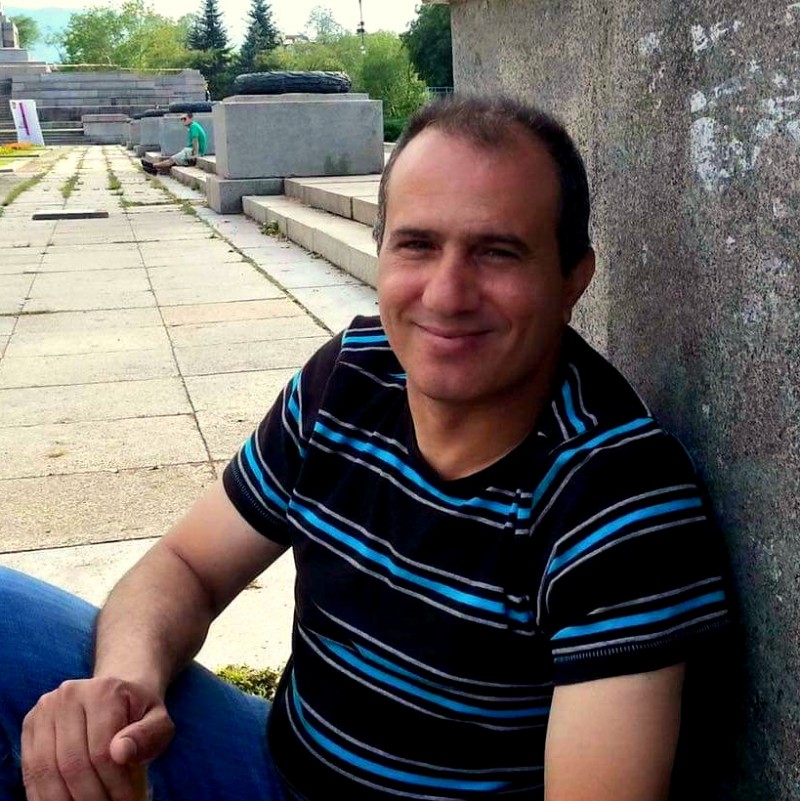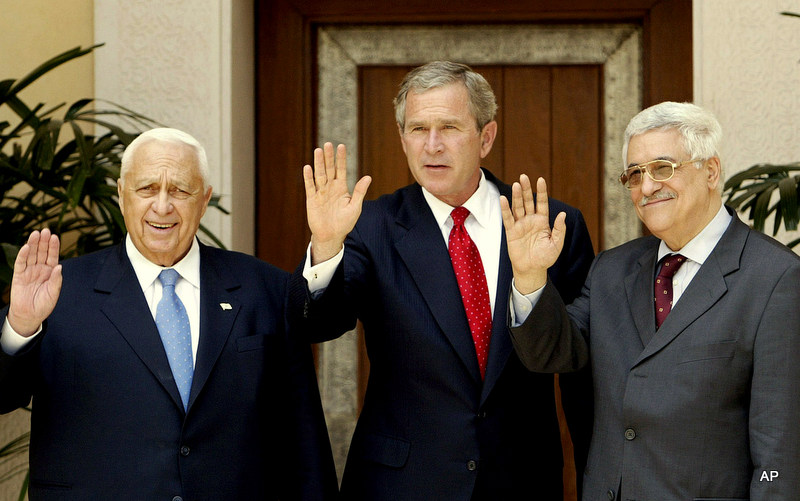
SOFIA, Bulgaria — The brutal death of a member of the Popular Front for the Liberation of Palestine at the Palestinian Authority’s embassy in Sofia, Bulgaria, serves as a grim reminder of the interminable cycle of the PA’s collaboration with, and dependence upon, Israel.
Omar Nayef Zayed, originally from the West Bank city of Jenin, was sentenced to life imprisonment in 1986 for the murder of an Israeli student in occupied East Jerusalem. Just four years into his sentence, he managed to flee after being transferred to a hospital following a 40-day hunger strike. In 1994, he settled in Bulgaria, where he was granted residency in 2012. The married father of three ran a vegetable shop in the country’s capital.
On Dec. 15, 2015, Israeli judicial authorities sought Zayed’s extradition through correspondence directed to the Bulgarian justice ministry, in which Zayed was deemed “a fugitive from justice.” Zayed’s home was raided two days later, prompting him to seek refuge at the PA’s embassy.
The details surrounding his death remain unclear. However, several incidents and statements shed light upon the high probability of collaboration and complicity between the PA, Israel and Bulgarian authorities.
Embassy staff discovered Zayed’s blood-soaked body in the embassy’s garden on the morning of Feb. 26. He died en route to a hospital, just hours after Bulgarian Prime Minister Boiko Borisov returned from meetings held in Israel and the Occupied Palestinian Territories, where Zayed’s extradition was among the issues discussed.
According to Zayed’s wife, Rania, PA personnel at the embassy pressured him to leave the embassy, telling him, “Israel has all the keys.” She was quoted as saying that embassy staff told Zayed, “Although you’re in the embassy, we can’t protect you. They used to threaten him to leave the embassy.”
Statements regarding his death were also contradictory. Initially, both Zayed’s family and Palestinian staff at the embassy spoke of evidence of inflicted violence upon his body. However, The Associated Press reported that Belgian authorities “said they had yet to determine whether he fell, jumped or was pushed from the building.” Further, the AP reported, “PFLP initially said Zayed had been shot, but Palestinian Ambassador Ahmed al-Madbuh did not repeat those claims and Bulgarian officials insisted there were no gunshot wounds.”

Speaking to MintPress News, Charlotte Kates, coordinator of : Palestinian Prisoner Solidarity Network, a network of activists working for the realization of the rights of Palestinian political prisoners, explains the intricacies of this latest assault on Palestinian autonomy and resistance.
For Palestinians, efforts to keep Zayed’s legacy alive are intertwined with the wider anti-colonial struggle. Zayed’s mysterious death at the embassy is an extension of the PA’s security coordination agreement with Israel — an agreement which has been used to mete out as collective punishment against Palestinians in the West Bank.
The political context of colonial violence is constantly producing new victims; however, Zayed’s murder should serve as an eye-opener regarding the absolute degradation of the Palestinian people by the internationally-recognized government and its representatives abroad.
MintPress News (MPN): What is the best way to shift discourse from the “failure to protect” to a complete willingness to collaborate in this assassination?
Charlotte Kates (CK): When we look at the role of the Palestinian Authority in the death of Omar Nayef Zayed, what we see is that it is fully responsible as part of the triangle of responsibility that killed Omar: the Israeli secret services and extradition attempt; the Bulgarian government and security services that sought to deliver Omar to the Israeli state; and the Palestinian Authority, that was charged with protecting Omar within the embassy, but instead subjected him to constant pressure to leave the embassy rather than protect him or provide him with the security that he required and deserved.
We do not yet have all the facts about what happened to Omar, or about how he was killed, or who exactly carried out these actions. There have been many reports, and a great deal of them have been contradictory and based on rumors. What we do know is that there are several simultaneous investigations being carried out, including independent investigations by Omar’s own comrades, that are fully trustworthy.
But what we also know is the political context for the killing of Omar, which includes the fact of PA security coordination with the Israeli occupation on a daily basis, at the expense of the Palestinian people and the Palestinian resistance. We see that, from the imprisonment of Palestinians for political reasons in PA jails today, to the imprisonment of Ahmad Sa’adat and his comrades in Jericho prison under U.S. and British guards in PA jails, and then their kidnapping in an armed attack by Israeli occupation forces, to the death of Omar Nayef Zayed, the Palestinian Authority, as a creation of Oslo, has acted as a full partner in the suppression of the Palestinian liberation movement rather than a protector of the Palestinian people.
Furthermore, what we also know — factually — is that Palestinian embassy staff, including the ambassador, Ahmed al-Madbuh, constantly pressured Omar to leave the embassy. They denied him visits with lawyers, solidarity delegations and Palestinian community activists. They regularly threatened to bar his wife from visiting him. Rather than acting as Omar’s defenders and protectors, they escalated the already massive levels of pressure and stress on Omar the entire time he was in the embassy.
MPN: What are the options for pursuing truth or justice, given the complicity of the PA in this crime?
CK: There are several investigations being carried out — the official Palestinian and Bulgarian investigations, and also independent investigations being carried out by Omar’s own comrades to determine the facts regarding the killing of Omar. There are various means for pursuing truth and justice, including pursuing accountability through the legal system as well as through the Palestinian liberation movement and the struggle of the Palestinian people.
Furthermore, it is also critical to keep Omar’s legacy, name, and struggle alive — holding ongoing events and protests at Palestinian and Bulgarian embassies, supporting the organizing of Palestinian communities in Bulgaria, in Europe, and throughout the shatat [the Palestinian diaspora] in institutions and community centers that reflect Omar’s values of struggle for liberation rather than coordination with the occupier — ensuring that Omar’s lifetime of struggle remains one that grows and deepens.
MPN: Have there been any other developments with regard to this case?
CK: There are ongoing developments in regard to the case. Investigations and legal actions are being pursued, and the campaign further developed. It is worth noting that the week before Omar was killed, he was visited by an international lawyer and contracted with a new Bulgarian lawyer to pursue his case; in that same week, his case was raised in parliamentary questions by several members of the European Parliament. At the time when Omar was killed, there were increasing protests on his behalf inside and outside Palestine, as well as impending and critically important legal and political developments in his struggle to prevent extradition.
Omar’s case was always important not only for Omar but for all Palestinians in Europe, especially former prisoners and veterans of the struggle, as the Israeli state wishes to pursue these people freely around the world. And Omar’s case remains critically important not only for him as an individual, but for his role as a Palestinian freed prisoner who struggled relentlessly for his own freedom and that of his people.
MPN: Is something being done internationally to [press] for justice in this case? I mean, not merely protests, but a coordinated effort to spread awareness and uncover the truth.
CK: In cities around Palestine — especially in Omar’s hometown of Jenin, where fellow former prisoners Khader Adnan and Mohammed Allan joined the protest — and outside Palestine, in Brussels, London, New York, Rome and elsewhere, people marched and protested for Omar and met with ambassadors. Leila Khaled [a member of the PFLP] went to the European Parliament with members of Samidoun and advocated for Omar. In the meantime, a legal strategy was being pursued to defend Omar and ensure his freedom, with a legal team working hard on his case.
Now that Omar’s life was taken, the campaign continues and in a new form, but still seeking justice for Omar Nayef Zayed. Like the campaign against Omar’s extradition, it is taking place on multiple levels of struggle, including legal work, investigations, and the Palestinian political side. Omar’s case is also one that is clearly very dear to the Palestinian resistance and the Palestinian liberation movement broadly inside Palestine.
On an international public level, the protests and advocacy that are happening alongside the legal, political and investigative work are actually quite critical to ensuring that Omar’s legacy lives on and grows. We want to make sure that Omar’s name is not forgotten, inside or outside Palestine. There are a number of Palestinian leaders who were assassinated in the 1960s and 1970s in Europe — Mahmoud Hamshari, Naim Khader, Wael Zuaiter, and numerous others. Omar Nayef Zayed is one of a long line of Palestinian martyrs, everywhere in exile and diaspora, and protests and struggle for his case, for the freedom of all Palestinian prisoners, and for the freedom of Palestine, are critical to carrying on that legacy and his own work.
MPN: Do you think this case will have any particular impact upon the PA’s image at an international level?
CK: It definitely has had an impact on the Palestinian level. Of course, Palestinians were already very aware of the corruption of the PA, its basis in the Oslo accords that have dramatically undermined the Palestinian liberation movement, and its constant security coordination that is a direct betrayal of the Palestinian resistance. But this case has underlined that the Palestinian Authority institutions outside, including the embassies, are not functioning on behalf of the Palestinian people. And this is having a real impact on Palestinian communities in diaspora around the world.
Far too many international governments that support the Palestinian Authority, like the U.S. government, do so explicitly as a security bulwark against the Palestinian resistance or to prevent or undermine the Palestinian intifada [popular uprising]. But for the international solidarity movement with Palestine, it reminds us that our reference is the Palestinian people and the liberation movement, the strugglers like Omar — who escaped Israeli prison after a 40-day hunger strike, who continued to organize the Palestinian community in Bulgaria 25 years later, who brought his daughter to lead chants against the Israeli war on Gaza and European complicity — and the Palestinian youth in the streets, the Palestinian prisoners in Israeli jails, the Palestinian refugees struggling to return home after 70 years of displacement, the Palestinian workers and popular classes, who are our reference, who lead the Palestinian liberation movement, not the Palestinian Authority.
MPN: How does Omar’s assassination and the role of the Palestinian embassy in Bulgaria reflect upon other Palestinian embassies with regard to offering refuge to Palestinians?
CK: Palestinian embassies should serve as a home for the Palestinian people, an arm of the liberation movement. Some of the Palestinians killed in Europe by the Mossad in the 70s were murdered precisely because of their work in establishing PLO liaison offices in Europe, building with the solidarity movement and the Palestinian communities. The Palestinian Authority’s system of embassies, unfortunately, is a product of the Oslo Accords; it does not fulfill this responsibility to the Palestinian people. And Omar’s case underlines that the Palestinian embassies are not places of safety or refuge for the Palestinian people. In order to change that perception, it is necessary to entirely change, to revolutionize, the reality of the function of the Palestinian embassies to serve the people instead of the narrow interests of the authority. The true “embassies” of the Palestinian people are the community centers and grassroots institutions built by Palestinians in exile and diaspora everywhere in the world, that support Palestinian refugees, prisoners and strugglers and defend the Palestinian cause.

